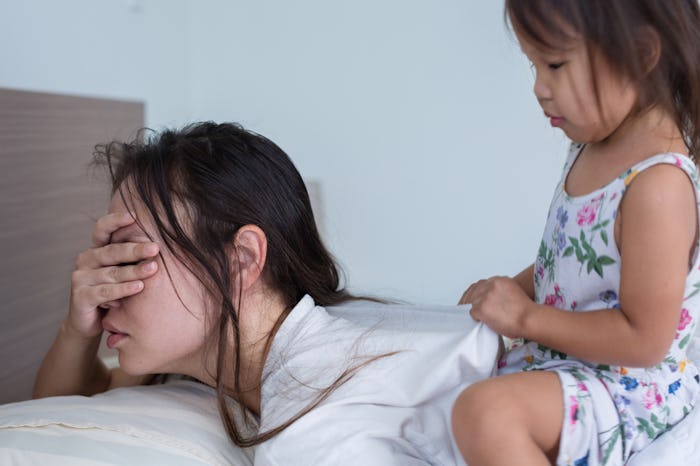Since my daughter was born, I have been living in a haze of perpetual exhaustion. Nightly cluster feedings combined with an irregular nap schedule have left me more than a little drowsy. But she's approaching the year mark, so I should be sleeping soundly soon, right? Not so much. According to recent research from the University of Warwick, new parents sleep poorly for years past babyhood, which means that I could be subsisting on coffee and cold showers for another half decade.
Researchers at Warwick University found that after the birth of their first child and up to six years later, mothers and fathers do not fully recover the levels of sleep duration and sleep satisfaction that they experienced prior to pregnancy, according to Science Daily. Sleep is at its worst three months after birth, and mothers experience more sleep loss after baby than fathers do, as The Guardian reported.
To determine the impact of children on parental sleep, a combination of researchers from Warwick University, the German Institute for Economic Research, and West Virginia University studied sleep in 4,659 parents who had their first child between the years of 2008 and 2015. The report, entitled "Long-term effects of pregnancy and childbirth on sleep satisfaction and duration of first-time and experienced mothers and fathers," was published in the journal Sleep.
Overall, moms were found to sleep on average one hour less during the first three months after birth than they did prior to pregnancy, according to The National. Comparatively, fathers slept an average of just 15 minutes less than they did before. (On a completely unrelated note, would someone mind forwarding these results to my husband who swears he is up with the baby more than I am?)
Participating researcher Dr. Sakari Lemola from the Department of Psychology at the University of Warwick told Science Daily that women are losing more sleep due to unequal responsibility levels. "Women tend to experience more sleep disruption than men after the birth of a child reflecting that mothers are still more often in the role of the primary caregiver than fathers," Lemola said of the findings.
And the disparity in time spent sleeping didn't end at infancy. When children were between 4 and 6 years of age, moms were still experiencing about 20 minutes shorter sleep duration while dads stayed at 15 minutes shorter, the research found, according to The Guardian. Similar findings were reported for sleep satisfaction.
Another factor, aside from parental sex or baby age, that appeared to influence sleep duration and satisfaction was experience level of parents, according to The National, and first-time parents experienced more pronounced sleep effects than those with more than one child. Additionally, according to the research, sleep effects in the first year were more pronounced in breastfeeding parents when compared to bottle-feeding.
Issues that did not come into play, according to Science Daily, were household income and dual or single parenting. According to The Telegraph, Lemola explained that despite the joy that comes from parenting, both mothers and fathers should be aware of the sacrifice that comes with it, namely shorter sleep.
"While having children is a major source of joy for most parents it is possible that increased demands and responsibilities associated with the role as a parent lead to shorter sleep and decreased sleep quality even up to 6 years after birth of the first child," Lemola explained, according to Science Daily.
There is no magic cure-all for the struggle that is sleep as a parent. But Parents listed a few recommendations on how to catch some z's with a little one in tow. Napping when your baby naps and trading off which parent gets up for nighttime feedings were among them.
In my experience, however, there isn't much you can do but accept your exhaustion and wait. Unfortunately, it looks like that wait might be a bit longer than I thought. Sigh.
